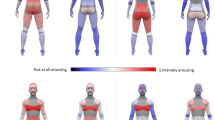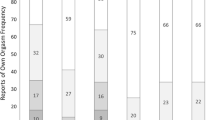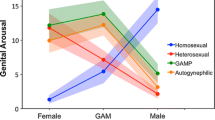Abstract
Personality traits, automatic thoughts and affective states play a major role on female sexual functioning. Nevertheless, little is known regarding the moderator role of personality traits on the relationship between automatic thoughts and affective states, and sexual functioning, in lesbian and heterosexual women. The current study aimed to test the moderator role of personality traits (e.g. neuroticism) on the relationship between automatic thoughts and affective states during sexual activity, and sexual functioning in a sample of lesbian and heterosexual women. Nine-hundred and forty-one women (697 heterosexual women; 244 lesbian women) completed an online survey about cognitive factors and sexual functioning. Participants completed the NEO-Five Factor Inventory, the Automatic Thoughts Scale from the Sexual Modes Questionnaire, the Positive Affect – Negative Affect Scale, and the Female Sexual Functioning Index. Main findings suggested neuroticism, sexual abuse thoughts, failure and disengagement thoughts, lack of erotic thoughts, and positive and negative affective states as significant predictors of female sexual functioning, regardless of sexual orientation. Moreover, women with higher levels of sexual abuse thoughts and higher absence of erotic thoughts, or lower levels of positive affective states, when presented higher levels of neuroticism, also reported a decrease in their sexual functioning, regardless of sexual orientation. Overall, neuroticism acts as moderator on the relationship between sexual abuse thoughts, lack of erotic thoughts and positive affective states, and sexual functioning, regardless of sexual orientation. Implications for improve sex therapy outcomes are discussed.



Similar content being viewed by others
Data Availability
The datasets generated during and/or analysed during the current study are not publicly available due to confidentiality of the data but are available from the corresponding author on reasonable request.
References
Aiken, L. S., & West, S. G. (1991). Multiple regression: Testing and interpreting interactions. Sage.
Baker, C. D. (1993). A cognitive-behavioural model for the formulation and treatment of sexual dysfunction. J. M. Ussher and C. D. Baker (Eds.). Psychological perspectives on sexual problems: New directions in theory and practice (pp.110-128). Routledge.
Barlow, D. (1986). Causes of sexual dysfunction: The role of anxiety and cognitive interference. Journal of Consulting and Clinical Psychology, 54, 140–148.
Beck, J. S. (1995). Cognitive therapy: Basics and beyond. The Guilford Press.
Carey, M. P., Wincze, J. P., & Meisler, A. W. (1993). Sexual dysfunction: Male erectile disorder. D. H. Barlow (Ed.). Clinical handbook of psychological disorders: A step-by-step treatment manual - 2nd edition (pp. 442-480). The Guilford press.
Carvalho, J., & Nobre, P. (2010a). Predictors of women’s sexual desire: The role of psychopathology, cognitive-emotional determinants, relationship dimensions, and medical factors. Journal of Sexual Medicine, 7, 928–937.
Carvalho, J., & Nobre, P. (2010b). Sexual desire in women: An integrative approach regarding psychological, medical, and relationship dimensions. Journal of Sexual Medicine, 7, 1807–1815.
Cohen, J. N., Byers, E. S., & Walsh, L. P. (2008). Factors influencing the sexual relationships of lesbians and gay men. International Journal of Sexual Health, 20, 162–176.
Costa Jr., P. T., & McCrae, R. R. (1992). Revised NEO personality inventory (NEO-PI-R) and NEO five-factor inventory (NEO-FFI) manual. Psychological Assessment Resources.
Crisp, C. C., Vaccaro, C. M., Pancholy, A., Kleeman, S., Fellner, A. N., & Pauls, R. (2013). Is female sexual dysfunction related to personality and coping? An exploratory study. Sexual Medicine, 1, 69–75. https://doi.org/10.1002/sm2.16.
DeRubeis, R. J., Tang, T. Z., & Beck, A. T. (2003). Cognitive therapy. K. S. Dobson (Ed.). Handbook of cognitive-behavioral therapies, second edition (pp- 349-392). The Guilford press.
Fagan, P., et al. (1991). A comparison of five-factor personality dimensions in males with sexual dysfunction and males with paraphilia. Journal of Personality Assessment, 57, 434–448.
Forbes, M. K., Baillie, A. J., & Schniering, C. A. (2016). Should sexual problems be included in the internalizing spectrum? A comparison of dimensional and categorical models. Journal of Sex and Marital Therapy, 42, 70–90.
Galinha, I. C., & Pais-Ribeiro, J. L. (2005). Contribuição para o estudo da versão portuguesa da Positive and Negative Affect Schedule (PANAS): II – Estudo psicométrico. Análise Psicológica, 2, 219–227.
Geonét, M., de Sutter, P., & Zech, E. (2013). Cognitive factors in women hypoactive sexual desire disorder. Sexologies, 22, e9–e15.
Harris, J., et al. (2008). Normal variations in personality are associated with coital orgasmic infrequency in heterosexual women: A population-based study. Journal of Sexual Medicine, 5, 1177–1183.
Kennedy, S., et al. (1999). Sexual dysfunction before antidepressant therapy in major depression. Journal of Affective Disorders, 56, 201–208.
Magalhães, E., et al. (2014). NEO-FFI: Psychometric properties of a short personality inventory in a Portuguese context. Psicologia: Reflexão e Crítica, 27, 642–657.
Malouff, J., Thorsteinsson, E., & Schutte, N. (2005). The relationship between the five-factor model of personality and symptoms of clinical disorders: A meta-analysis. Journal of Psychopathological Behavior, 27, 101–114.
Meana, M., & Nunnink, S. E. (2006). Gender differences in the content of cognitive distraction during sex. Journal of Sex Research, 43, 59–67.
Morton, H., & Gorzalka, B. B. (2013). Cognitive aspects of sexual functioning: Differences between east Asian-Canadian and euro-Canadian women. Archives of Sexual Behavior, 42, 1615–1625.
Moyano, N., & Sierra, J. C. (2013). Relationships between personality traits and positive/negative sexual cognitions. International Journal of Clinical and Health Psychology, 13, 189–196.
Nelson, A. L., & Purson, C. (2011). Non-erotic thoughts, attentional focus, and sexual problems in a community sample. Archives of Sexual Behavior, 40, 395–406.
Nobre, P. (2009). Determinants of sexual desire problems in women: Testing a cognitive-emotional model. Journal of Sex and Marital Therapy, 35, 360–377.
Nobre, P. (2013). Male sexual dysfunctions. J. G. Hofmann (Ed.). The Wiley handbook of cognitive behavioral therapy. Part two (pp. 645-672). Wiley-Blackwell.
Nobre, P., & Pinto-Gouveia, J. (2003). Sexual modes questionnaire: Measure to assess the interaction among cognitions, emotions, and sexual response. Journal of Sex Research, 4, 368–382.
Nobre, P., & Pinto-Gouveia, J. (2006). Emotions during sexual activity: Differences between sexually functional and dysfunctional men and women. Archives of Sexual Behavior, 35, 491–499.
Nobre, P., & Pinto-Gouveia, J. (2008a). Cognitive and emotional predictors of female sexual dysfunctions: Preliminary findings. Journal of Sex and Marital Therapy, 34, 325–342.
Nobre, P., & Pinto-Gouveia, J. (2008b). Differences in automatic thoughts presented during sexual activity between sexually functional and dysfunctional men and women. Cognitive Therapy and Research, 32, 37–49.
Oliveira, C., Laja, P., Carvalho, J., Quinta Gomes, A., Vilarinho, S., Janssen, E., & Nobre, P. J. (2014). Predictors of men's sexual response to erotic film stimuli: The role of affect and self-reported thoughts. Journal of Sexual Medicine, 11, 2701–2708.
Paulus, D. J., Vanwoerden, S., Norton, P. J., & Sharp, C. (2016). From neuroticism to anxiety: Examining unique contributions of three transdiagnostic vulnerability factors. Personality and Individual Differences, 94, 38–43. https://doi.org/10.1016/j.paid.2016.01.012.
Pechorro, P., et al. (2009). Validação portuguesa do índice de Funcionamento Sexual Feminino (FSFI) [Portuguese validation of the Female Sexual Functioning Index (FSFI)]. Laboratório de Psicologia, 7, 33–44.
Peixoto, M. M., & Nobre, P. (2016a). Personality traits, sexual problems, and sexual orientation: An empirical study. Journal of Sex and Marital Therapy, 42, 199–213.
Peixoto, M. M. & Nobre, P. (2016b). Positive and negative affect during sexual activity: Differences between homosexual and heterosexual men and women, with and without sexual problemas. Journal of Sex and Marital Therapy, 42(1), 4–17
Peixoto, M. M., & Nobre, P. (2020). Cognitive-emotional predictors of sexual functioning in lesbians, gays, and heterosexuals. Archives of Sexual Behavior, 49, 1823–1838.
Purdon, C., & Holdaway, L. (2006). Non-erotic thoughts: Content and relation to sexual functioning and sexual satisfaction. Journal of Sex Research, 43, 154–162.
Quinta-Gomes, A., & Nobre, P. (2012). Personality traits and psychopathology on male sexual dysfunction: An empirical study. Journal of Sexual Medicine, 8, 461–469.
Rosen, R. C., et al. (2000). The female sexual function index (FSFI): A multidimensional self-report instrument for the assessment of female sexual function. Journal of Sex and Marital Therapy, 26, 191–208.
Sbrocco, T. & Barlow, D. H. (1996). Conceptualizing the cognitive component of sexual arousal: Implications for sexuality research and treatment. P. M. Salkovskis (Ed.). Frontiers of Cognitive Therapy (pp: 419–449). The Guilford Press.
Shrier, L. A., Feldman, H. A., Black, S. K., Walls, C., Kendall, A. D., Lops, C., & Beardslee, W. R. (2012). Momentary affective states surrounding sexual intercourse in depressed adolescents and young adults. Archives of Sexual Behavior, 41, 1161–1171.
Soares, C., & Nobre, P. (2012). Sexual problems, cultural beliefs, and psychosexual therapy in Portugal. K. Hall and C. Graham (Eds.). The cultural context of sexual pleasure and problems: Psychotherapy with diverse clients (pp. 278-306). Routledge.
Vilarinho, S., Laja, P., Carvalho, J., Quinta-Gomes, A. L., Oliveira, C., Janssen, E., & Nobre, P. J. (2014). Affective and cognitive determinants of Women’s sexual response to erotica. Journal of Sexual Medicine, 11, 2671–2678.
Watson, D., & Clark, L. (1994). Manual for the positive and negative affect schedule: Expanded form. University of Iowa.
Widiger, T. A., & Oltmanns, J. R. (2017). Neuroticism is a fundamental domain of personality with enormous public health implications. World psychiatry: Official Journal of the World Psychiatric Association, 16, 144–145. https://doi.org/10.1002/wps.20411.
Wiegel, M., Scepkowski, L. A., & Barlow, D. H. (2007). Cognitive-affective processes in sexual arousal and sexual dysfunction. In E. Janssen (Ed.), The psychophysiology of sex (pp. 143–165). Indiana University Press.
Acknowledgements
This study was supported by a grant from the Portuguese Foundation for Science and Technology (Reference: SFRH/BD/72919/2010). The author would like to thank Professor Pedro Nobre for his support during data collection.
Author information
Authors and Affiliations
Corresponding author
Ethics declarations
Ethical Statement
All procedures performed were in accordance with the ethical standards of the institutional ethics committee and with the 1964 Helsinki declaration and its later amendments. The current study is part of a research project approved by Aveiro University Ethics Committee.
Informed Consent
Informed consent was obtained from all individual participants included in the study.
Conflict of Interest
The authors have no conflicts of interest to declare that are relevant to the content of this article.
Additional information
Publisher’s Note
Springer Nature remains neutral with regard to jurisdictional claims in published maps and institutional affiliations.
Rights and permissions
About this article
Cite this article
Peixoto, M.M. The moderator role of neuroticism in the relationship between sexual thoughts and affective response during sexual activity, and sexual functioning: A study with heterosexual and lesbian women. Curr Psychol 42, 3427–3436 (2023). https://doi.org/10.1007/s12144-021-01703-w
Accepted:
Published:
Issue Date:
DOI: https://doi.org/10.1007/s12144-021-01703-w




